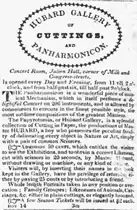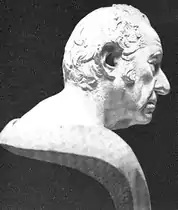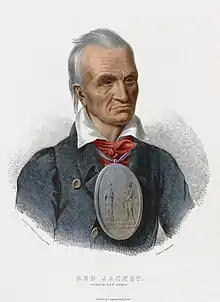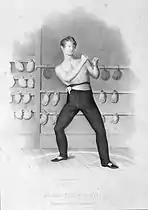Julien Hall (built 1825) was a building in Boston, Massachusetts, on the corner of Congress Street and Milk Street. It flourished 1825-1843, housing a variety of public events such as lectures by Red Jacket, William Lloyd Garrison; temperance meetings; political meetings; auctions; exhibitions of live animals, portraits by William James Hubard, John H. I. Browere; performances of the "automaton chess player" and the "panharmonicon;" and so on. By 1842 boxer John Sheridan had converted space in the hall into an athletic gymnasium.
The building was known as "Julien Hall" because it had been "built on the land where formerly stood the much noted Julien's Restorator." It was also called "Congress Hall."[1] In 1828 it was described as "a large and convenient edifice ... erected in 1825, by Dr. Edward H. Robbins. ... There are two halls in this building, 55 by 44 feet square; the principal one is 15 feet high, and receives light through the cupola in the centre. These are rented for various purposes, such as public exhibitions, the holding of meetings, &c."[1]
Events at the Hall
|
|
Images
 Advertisement for Hubard Gallery of Cuttings, and Panharmonicon, 1825
Advertisement for Hubard Gallery of Cuttings, and Panharmonicon, 1825 Browere's life mask portrait of artist Gilbert Stuart, ca.1825; displayed in the hall 1825
Browere's life mask portrait of artist Gilbert Stuart, ca.1825; displayed in the hall 1825 Portrait of Red Jacket, who spoke at Julien Hall, 1829
Portrait of Red Jacket, who spoke at Julien Hall, 1829 Portrait of George Thompson, who spoke at Julien Hall, 1835
Portrait of George Thompson, who spoke at Julien Hall, 1835 John Sheridan, proprietor of Sheridan's Gymnasium, 1842-1843
John Sheridan, proprietor of Sheridan's Gymnasium, 1842-1843
References
- 1 2 Bowen's picture of Boston. 1828, 1838
- ↑ Boston Commercial Gazette Dec.1, 1825
- ↑ Columbian Centinel, Oct. 15, 1825
- ↑ Boston Commercial Gazette, Dec.12, 1825
- ↑ James W. Cook, Jr. (Winter 1995). "From the Age of Reason to the Age of Barnum: The Great Automaton Chess-Player and the Emergence of Victorian Cultural Illusionism". Winterthur Portfolio. 30.
- ↑ Boston Commercial Gazette, Sept. 14, 1826
- ↑ John F. Ohl; Joseph Earl Arrington (Jan 1960). "John Maelzel, Master Showman of Automata and Panoramas". Pennsylvania Magazine of History and Biography. 84.
- ↑ Boston Commercial Gazette, Nov.30, 1826
- ↑ Salem Gazette; Date: 04-03-1827
- ↑ Intemperance: To the Sober and Discreet, the Benevolent, the Religious, the Friends of Decency. Hallowell Gazette (Maine); Date: 12-05-1827
- ↑ Farmers' Cabinet (New Hampshire); Date: 04-04-1829
- ↑ Essex Gazette (Haverhill, Massachusetts); Date: 04-10-1830
- ↑ New-Hampshire Patriot and State Gazette; Date: 08-23-1830
- ↑ William L. van Deburg (Jun 1975). "William Lloyd Garrison and the "Pro-Slavery Priesthood": The Changing Beliefs of An Evangelical Reformer, 1830-1840". Journal of the American Academy of Religion. 43 (2).
- ↑ Roderick S. French (Summer 1980). "Liberation from Man and God in Boston: Abner Kneeland's Free-Thought Campaign, 1830-1839". American Quarterly. 32 (2).
- ↑ Rhode Island American, Statesman and Providence Gazette; Date: 01-08-1830
- ↑ Hervey Wilbur (Jan 1, 1831). "Newtonian Institute". Retrieved 2010-09-06.
- ↑ Pittsfield Sun (Massachusetts); Date: 07-18-1833
- ↑ NEASS, Third Annual Report, p.3; cited in: Lois Brown. Out of the Mouths of Babes: The Abolitionist Campaign of Susan Paul and the Juvenile Choir of Boston. New England Quarterly, Vol. 75, No. 1 (Mar., 2002)
- ↑ Susan Paul was the daughter of Boston preacher Thomas Paul
- ↑ Theophilus Fisk (1835). Capital against labor: an address, delivered at Julien Hall, before the Mechanics of Boston, on Wednesday evening, May 20. Boston: For sale at the Daily Reformer Office.
- ↑ Colonization Discussion. New Bedford Mercury (Massachusetts); Date: 07-24-1835
- ↑ "Thompson, the wandering insurrectionist, came in, and tried to take part." cf. Eastern Argus (Maine); Date: 07-25-1835
- ↑ Portsmouth Journal of Literature & Politics (New Hampshire); Date: 08-08-1835
- ↑ The Notorious Thompson. Richmond Enquirer (Virginia); Date: 10-20-1835
- ↑ Elaine Brooks (Jul 1945). "Massachusetts Anti-Slavery Society". Journal of Negro History. 30 (3).
- ↑ Daily Atlas (Boston); Date: 04-30-1842
- ↑ Daily Atlas (Boston); Date: 10-04-1843